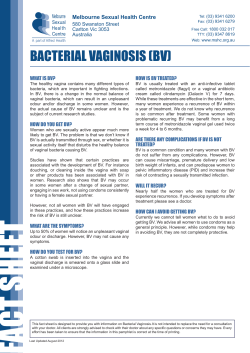
Vaginal Symptoms: Causes & Management (Carol Totterdell Professional Development Nurse)
Vaginal Symptoms: Causes & Management (Carol Totterdell Professional Development Nurse) Aims and objectives: To have a basic understanding of signs and symptoms of STIs Have an awareness of vaginal symptoms and genital conditions in women Have an understanding of own scope of practice and when to refer Genital tract symptoms • Unusual vaginal discharge • Bleeding • Bleeding between periods &/or after sex • Pain when passing urine • • • • • • Lower abdominal pain Discharge from the penis (in men) Burning and itching in the genital area Pain when passing urine Genital lumps, spots, sores Rashes and swellings Age groups of women • Reproductive age – some degree of vaginal discharge is normal and healthy – Important to differentiate between normal/abnormal (changes, odour, onset, duration, colour, consistency) (NB Pregnant women may be at special risk & should be referred) • Pre pubertal Discharge usually not normal - refer • Post menopausal Common causes of vaginal discharge • Infective (non sexually transmitted) Bacterial vaginosis Candida • Infective (sexually transmitted) • Non infective Foreign bodies (retained tampons) Cervical polyps and ectopy Genital tract malignancy Fistulae Dermatological conditions Infective (non sexually transmitted) Bacterial Vaginosis • Commonest cause of vaginal discharge in women of reproductive age • Overgrowth of mixed anaerobic organisms which replace normal lactobaccilli. • Can occur and remit spontaneously • Sexually associated rather than sexually transmitted • • • • • Infective (non sexually transmitted) Vulvo-vaginal Candidiasis Caused by an overgrowth of yeasts Does not require treatment unless symptomatic Most common when vagina exposed to oestrogen during reproductive years & pregnancy Can be precipitated by use of antibiotics Immuno-compromised women and those with diabetes more predisposed What Are the Main Sexually Transmitted Infections? The commonest infection Chlamydia Number 2 Genital Warts Number 3 Gonorrhoea Genital Herpes Women with cervicitis due to Herpes may occasionally present with vaginal discharge Syphilis • Primary stage - sores may appear on the penis, vagina, anus or mouth. • 2ndary stage - All over skin rash, flu like symptoms, lethargy, anorexia • Tertiary Stage - Large Ulcers Heart Failure Encephalitis, loss of mental faculties. Deterioration of central nervous system leading to paralysis and death Trichomonas Vaginalis Can cause vaginal discharge and urethral irritation. Much rarer than BV or VVC Pubic lice HIV BV may be more prevalent and persistent in HIV positive women. TV may increase transmission of the HIV virus Possible Complications from STI Infection • Pelvic Inflammatory Disease (PID) in women • Ectopic pregnancy • Prostatitis & Epididymo-orchitis in men • Infertility & chronic pain in both sexes • Reactive arthritis • Conditions involving other systems of the body – disseminated gonococcal infection, secondary & tertiary syphilis • Some infections are easily treated but others are not curable, e.g. Hepatitis, Herpes and HIV. • Even when treated some infections may have lifelong implications for the individuals affected. Things to consider • Vaginal discharge alone is a poor predictor of an STI • STIs often come in pairs/groups • Many women with an STI are asymptomatic – aprox 70% with Chlamydia, 50% with Gonorrhoea • Most common causes of altered vaginal discharge are physiological, BV and Candida but STIs and other causes must be considered AND! The first symptoms of gynaecological cancer may be alterations in the menstrual cycle, intermenstrual bleeding, post coital bleeding, post menopausal bleeding or vaginal discharge (NICE 2005) Management of vaginal discharge • • • • • • • • • Full clinical assessment and history Address underlying concerns/expectations Assessment of sexual activity and risk factors Assessment of symptoms & associated symptoms Medication history/contraception Clinical examination and investigation Assessment of upper genital tract infection Treatment of client and partners where necessary Advice – re-infection and self help measures What can you offer in the pharmacy? • Advise clients with genital symptoms to seek medical advice – especially if symptoms persist or do not improve after OTC treatment • Advise STI screening if they are sexually active • Keep up the good work with the CASPHER screens! • Advice and support Tips For Your Bits! • Regular changing of sanitary protection – don’t wear panty liners all the time • Avoid douching • Avoid strongly perfumed toiletry products and “feminine hygiene products”. Use of emollients/soap substitutes for washing • Use non bio washing powders • Wash pants at 60%C • Don’t wash hair in the bath • Shower in preference to bathing References • Faculty of Sexual & Reproductive Healthcare Clinical Guidance: Management of Vaginal Discharge in Non-Genitourinary Medicine Settings (2012) available at www.fsrh.org • Mitchell H (2004) Vaginal discharge – causes, diagnosis & treatment BMJ 2004; 328:1306
© Copyright 2025





















